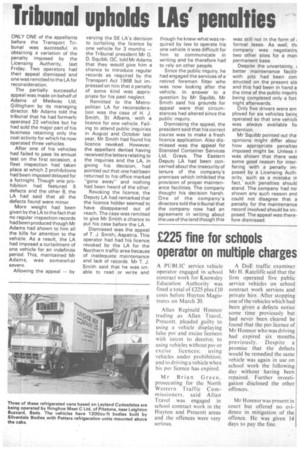Tribunal upholds Lk' penalties
Page 23

If you've noticed an error in this article please click here to report it so we can fix it.
ONLY ONE of the appellants before the Transport Tribunal was successful in obtaining a variation of the penalty imposed by the Licensing Authority, last Friday. Two operators had their appeal dismissed and one was remitted to the LA for reconsideration.
The partially successful appeal was made on behalf of Adams of Medway Ltd, G Hingham by its managing director. Mr Adams told the tribunal that he had formerly operated 22 vehicles but he had sold the major part of his business retaining only the coal activity for which he now operated three vehicles.
After one of his vehicles had failed to pass its annual test on the first occasion, a fleet inspection had taken place at which 2 prohibitions had been imposed delayed for a fortnight. Though one prohibition had featured 5 defects and the other 8, the LA had said that all the defects found were minor.
More weight had been given by the LA to the fact that no regular inspection records had been produced though Mr Adams had shown to him all the bills for attention to the vehicle. As a result, the LA had imposed a curtailment of one vehicle for an indefinite period. This, maintained Mr Adams, was somewhat severe.
Allowing the appeal — by varying the SE LA's decision to curtailing the licence by one vehicle for 3 months -the Tribunal president Mr G. D. Squibb, QC, told Mr Adams that they would give him a chance to introduce regular records as required by the Transport Act 1968 but impressed on him that a penalty of some kind was appropriate for his past neglect.
Remitted to the Metropolitan LA for reconsideration was the case of H. J. Smith, St Albans, with a licence for one vehicle. Failing to attend public inquiries in August and October last year, Mr Smith had found his licence revoked. However, the appellant denied having received the letters relating to the inquiries and the LA, in giving his decision, had pointed out that one had been returned to his office marked "gone away" and nothing had been heard of the other.
Revoking t e licence, the Deputy LA had remarked that the licence holder seemed to have disaplared out of reach. The ca e was remitted to give Mr Smith a chance to put his case b fore the LA.
Dismissed as the appeal of T. J. Smith, Aspatria. This operator had ad his licence revoked by t e LA for the Northern traff c area because of inadequat maintenance and lack of re ords. Mr T. J. Smith said th t he was unable to read or write and though he knew what was required by law to operate his one vehicle it was difficult for him to communicate in writing and he therefore had to rely on other people.
Since the public inquiry, he had engaged the services of a ' retired foreman fitter who was now looking after the vehicle. In answer to a question by Mr Squibb, Mr Smith said his grounds for appeal were that circumstances had altered since the public inquiry.
Dismissing the appeal, the president said that his correct course was to make a fresh licence application. Also dismissed was the appeal for Stansted Container Services Ltd, Grays. The Eastern Deputy LA had been concerned about the insecurity of tenure of the company's premises which inhibited the provision of proper maintenance facilities. The company thought his decision harsh. One of the company's directors told the tribunal that the company now had an agreement in writing about the use of the land though this was still not in the form of i formal _lease. As well, thi company was negotiatini two other sites for a mon permanent base.
Despite the uncertainty, i better maintenance facilit with pits had been con structed on the present sib and this had been in hand a the time of the public inquiry being completed only a fort night afterwards.
Only five drivers were em ployed for six vehicles bein operated so that one vehicIE was always available foi attention.
Mr Squibb pointed out tha. opinions might differ abou. how appropriate penaltie; imposed might be. Unless ii was shown that there wa; some good reason for interfering with a penalty imposed by a Licensing Authority, such as a mistake in fact, such penalties should stand. The company had not shown any such reason and
could not disagree that a penalty for the maintenance record involved should be imposed. The appeal was therefore dismissed.




























































































